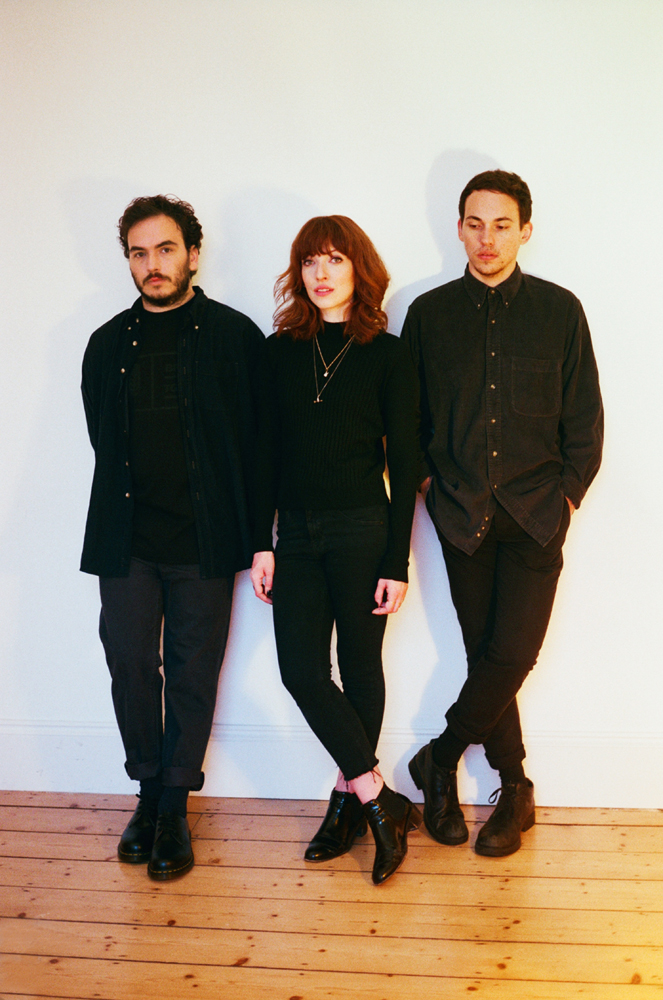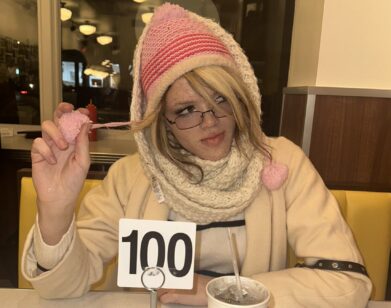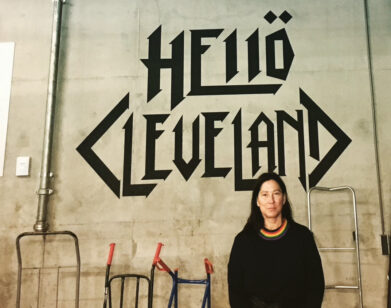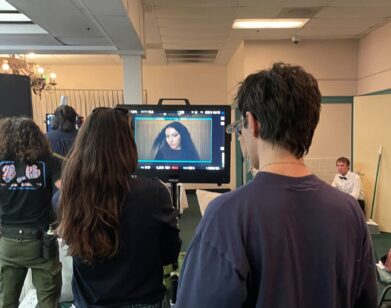Daughter Refuses to Disappear

ABOVE: DAUGHTER. PHOTO COURTESY OF FRANCESCA JANE ALLEN.
It’s been three years since U.K. indie-folk trio Daughter released its debut album If You Leave, but with the group’s forthcoming LP, it’s like they never left. Not to Disappear (out this Friday, January 15) features the same haunting vocals from lead singer Elena Tonra, but with added confidence. The band has found comfort in transparency, perhaps something that resulted from the imminent success If You Leave. On Not to Disappear, the trio explores the motions of loneliness, sex, and heartbreak, collecting memories and moments that fuel the songwriting and melodies. Similar to If You Leave, Not To Disappear is full of melancholy, but also strength. You see Tonra finding herself once again before the end of the 10 tracks. While many bands cite other musicians as influences, Daughter decidedly blocked out listening to new artists in order to create something they feel is truly original.
Before their Radio City show with Ben Howard in late 2015, we caught up with Tonra and band members Igor Haefeli and Remi Aguilella about writing a second record, lyrical over-sharing, and finding confidence in music.
ILANA KAPLAN: It’s been three years since your debut came out. Can you tell me about what the writing and recording process was like for you this time around?
ELENA TONRA: We officially started writing it about two years ago. We had come off touring for an extensive and intense amount of time. We stopped touring as much, we rented a space, and put all of our instruments, microphones and equipment in this space and made it a writing and demo-ing situation. It was great because we could go in at any hour we liked and if we had any ideas, we could make them there. That was kind of the start of the process. Each song had a different way of coming about. In some, the music was written first while others it was the lyrics. We didn’t want to overthink anything too much—we just wanted to, writing-wise, chuck out as many ideas as possible. It was really cool that we had a lot of different stuff going on in our heads. There were some tracks that were really far away from what we’ve done before and some that were really folky, and others that didn’t make it onto the records.
IGOR HAEFELI: This time around, we got to cherry pick.
REMI AGUILELLA: We went in the studio with a pretty clear idea of what we wanted to do. There was more preparation in terms of not having to freak out in the studio as much.
KAPLAN: If You Leave, was extremely melancholy. I think anyone who has heard it probably cried at some point during it. Do you think Not To Disappear will have the same effect? Is there an upbeat side to this record?
TONRA: It’s a bit different. For me, there’s stuff that’s sad because it’s such a personal record. I’m not sure, if you’re the listener, if it’ll have the same effect. Our first record was maybe more emotional because it wasn’t really a breakup album, but it was that weird ‘pre-everything going to shit’ album. I think that sentiment was beautifully recognized by people saying I feel the same way. This record is a bit more aggressive and lyrically, I think it’s a bit more straightforward. I don’t think there’s as much poetic license or hiding places within my lyrics. It’s quite direct about my feelings.
KAPLAN: Why do you think that is?
TONRA: I don’t know, actually. To be fair, it really worried me initially because I was writing very stream of consciousness stuff. I just wasn’t writing the same way, and I really worried that I couldn’t write anymore. I worried that it was the end of the band. [laughs] I just had to embrace that what I’m thinking and feeling is more confident, in a way. It’s confident in its lack of confidence.
HAEFELI: It’s definitely about Elena finding strength in the lyrics on Not To Disappear. To me, the title evokes coming from a place where you’ve nearly faded away and trying to fight back.
TONRA: There’s always fighting and bringing that person out of a miserable hole on the first album.
KAPLAN: Do you mean disappearing from depression?
TONRA: I think disappearing in different ways. You can disappear inside of yourself and become an empty shell with depression in mind. It’s that feeling of being invisible. Sometimes when I wake up I don’t feel like my head is attached to my body—there’s nothing. On “Numbers” it’s basically a repeating mantra of ‘I feel numb.’ It’s not disappearing in that sense, and it’s not disappearing in an artistic sense—trying to make something beautiful that means something. If it’s something beautiful that means something just to us, that’s enough.
AGUILELLA: I think we talk a lot about reminiscing about alienation and looking through a specific person’s eyes. I think it’s figuratively disappearing, but not so much in your entire self.
TONRA: You can take it in all different ways.
KAPLAN: What’s the most personal thing you’ve written about thus far?
TONRA: Everything is super personal. Basically all of the songs are ‘this is my life and what I feel about it.’ That’s how my brain works and thinks about things. It’s really strange because I never really think about what I want to write about—it sort of just comes out. I literally say whatever is in my brain. “Doing The Right Thing” is a song that was really hard because I started writing it and wasn’t really thinking about it. I just started spouting out whatever I could think of and it became this song about my grandmother and my mother. It was something I didn’t realize affected me as much as I thought. I find it interesting when I look back at songs and it’s what I’ve been thinking and feeling for the past two years. There’s some sexual stuff in this record and I’m sometimes like, “Is that too far?” There’s a confidence in it. It’s over-sharing, but in a really therapeutic way.
KAPLAN: There’s obviously the sophomore slump idea that second records are often a disappointment to fans. Does that concern you guys?
TONRA: I think we try to let it not concern us. There’s this weird pressure also because our first album totally exceeded everything we expected; we didn’t really think people would be as beautiful and kind about it as they were. For us, that was really surprising and amazing. Now, we’re going into the second album and trying not to compare it to the first album and seeing it as a completely new stage. If you have that outlet—and we shouldn’t confine ourselves to music or genre—it’s really great because you can literally do whatever you want. Obviously now that it’s finished, we’re thinking of the technical side of things.
AGUILELLA: I think you need to trust your sensibilities. We’re all coming from different directions, and it just ends up being what it is. If we’re happy with it, then that’s a big achievement. We do it quite selfishly in a way—for our pleasure. It’s amazing people relate to it. I think Elena’s lyrics have a lot to do with it.
HAEFELI: We had played the songs from the first album over and over again and some of them became more aggressive on stage. I think that, in an interesting way, influenced our second album.
KAPLAN: When we spoke two years ago, Elena, you and Igor were romantically involved. Are you two still together? How has that affected the music?
HAEFELI: No. It’s worked out as a record. It wasn’t an easy record to make—maybe a little bit of it is how that change happened. Maybe it’s what brought us together in another way, as friends. We’re still very creative together.
AGUILELLA: Because you guys weren’t together, space had a lot to do with the making of this record. Being further away to concentrate on something that didn’t have to do with the band was good. It was a healthy way of dealing with music and life, rather than being in a tour bus all together. It was needed.
KAPLAN: It’s very admirable. How did you decide on releasing “Doing The Right Thing” as the first single?
TONRA: It was quite hard for us to decide. When you’re making something, you obviously like every song. It’s sort of like what song represents the album or what song represents the change we made, musically. We had a couple of people who were like, ‘we love this song!’
AGUILELLA: I just think it’s just a nice song to start with.
NOT TO DISAPPEAR WILL BE RELEASED FRIDAY, JANUARY 15 VIA 4AD IN THE U.K. AND GLASSNOTE RECORDS IN THE U.S.






